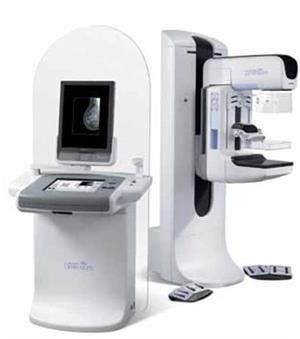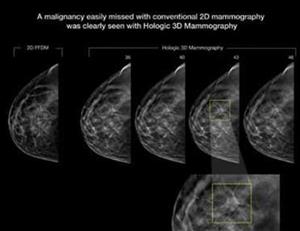Jan 11, 2017, 14:53
by
Jonathan Andrews, Associate Vice President of Ancillary Services


Advanced Imaging has become a very important tool in the early detection of cancer. At Sansum Clinic, we are utilizing our high tech imaging capabilities with both computed tomography (CT) and mammography to effectively screen our patients in the interest of detecting cancer as soon as possible. Early detection is key to the most successful treatment and outcomes. Here are some updates on our services.
Breast Cancer Screening
3D Mammography/Breast Tomosynthesis
With a continued and dedicated interest in supporting and caring for the women in our community, Sansum Clinic has – with the help of gifts from grateful patient – invested in new 3D Mammography technology, or Breast Tomosynthesis. Our standard 2D digital mammographic imaging has been, and is, an amazing tool for the early detection of cancers. Upgrading to this new 3D technology, the Selenia Dimensions from Hologic®, can help us detect cancers much earlier and those cancers can be caught when they are much smaller, making them easier to treat. A recent article, “Breast Cancer Screening Using Tomosynthesis in Combination with Digital Mammography” from the Journal of the American Medical Association (JAMA, June 25, 2014) highlights the distinct benefit of the technology after a total of 454,850 examinations (281,187 conventional mammograms compared to 173,663 3D mammograms) were conducted. A few of the significant findings are:
- A 41% increase in the detection of invasive breast cancers
- A 29% increase in the detection of all breast cancers
- A 15% decrease in women recalled for additional imaging
An increase in the number of cancers detected is significant and the benefit may seem obvious to those reading this article. Maybe not so obvious in significance is the decrease in the number of women recalled for additional imaging. This means that we can effectively reduce the radiation exposure from additional imaging, and perhaps more importantly, reduce the worry, anxiety and stress among our patients associated with those callbacks.
To learn more about this exciting new technology, please visit www.hologic.com.
Automated Breast Ultrasound System (ABUS)
Approximately 40% of the women in the United States have dense breast tissue. Dense breast tissue is quite common, though it can make reading a 2D Mammogram more challenging. In order to more effectively screen women with dense breasts, Sansum Clinic offers an exam known as Automated Whole Breast Ultrasound. When used in conjunction with mammography, this technology can help lead to the detection of significantly more cancers than mammography alone.
Lung Cancer Screening
Sansum Clinic (and the Cancer Center of Santa Barbara with Sansum Clinic) has been designated as an American College of Radiology (ACR) Lung Cancer Screening Center offering patients an option for lung cancer screening as recommended by the U.S. Preventive Services Task Force.
Lung cancer is the third most common cancer and the leading cause of cancer death in the United States, taking the lives of more people each year than breast, colon and prostate cancers combined. The most important risk factor for lung cancer is smoking. Although the prevalence of smoking has decreased, approximately 37% of U.S. adults are current or former smokers. The incidence of lung cancer increases with age and occurs most commonly in people age 55 years or older. Increasing age and cumulative exposure to tobacco smoke are the two most common risk factors for lung cancer.
Lung cancer has a poor prognosis, and nearly 90% of people with lung cancer die of the disease. However, early-stage nonsmall cell lung cancer (NSCLC) has a better prognosis and can be treated with surgery. Evidence suggests that lung cancer screening programs can detect approximately one-half of lung cancer cases at an early stage, at which surgery with curative intent is an option. Sansum Clinic and the Cancer Center are now offering lung cancer screenings to qualified patients based on the recommendations of the U.S. Preventive Services Task Force, which recommends yearly lung cancer screening for people who:
- Have a history of heavy smoking (equivalent to smoking one pack per day for 30 years or two packs per day for 15 years)
- Smoke now or have quit within the past 15 years
- Are between 55 and 80 years old
The new lung cancer screening is a low-dose computed tomography (LDCT). In this test, a computerized tomography (CT) machine scans the body and uses low doses of radiation to make detailed pictures of the lungs. LDCT is currently the only recommended screening test for lung cancer.
Although lung cancer screening is not an alternative to smoking cessation, the U.S. Preventive Services Task Force found adequate evidence that annual screening for lung cancer with LDCT of high-risk people can prevent a substantial number of lung cancer-related deaths. At this time, approximately 160,000 people die from lung cancer each year. If the Task Force’s recommendations were fully implemented, approximately 20,000 lives each year could be saved. However, screening alone cannot prevent most lung cancer-related deaths, and smoking cessation remains essential.
For more information about lung cancer screening offered at Sansum Clinic please contact your primary care physician or call 1(800) 4-Sansum (1-800-472-6786).